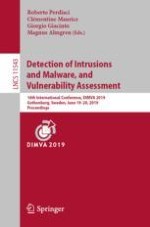2019 | OriginalPaper | Chapter
How Does Malware Use RDTSC? A Study on Operations Executed by Malware with CPU Cycle Measurement
Author : Yoshihiro Oyama
Published in: Detection of Intrusions and Malware, and Vulnerability Assessment
Publisher: Springer International Publishing
Activate our intelligent search to find suitable subject content or patents.
Select sections of text to find matching patents with Artificial Intelligence. powered by
Select sections of text to find additional relevant content using AI-assisted search. powered by
